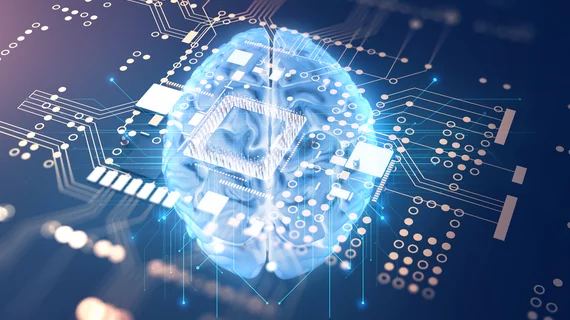A number of healthcare technology companies are pivoting to develop artificial intelligence solutions that detect abnormalities on imaging exams for healthcare workers struggling to stem the spread of COVID-19.
One such firm, RadLogics, based in both Israel and Boston, recently unveiled a platform that analyzes CT scans to automatically identify the coronavirus. Developed using multiple international datasets, the technique is highly accurate. It diagnosed 157 patients—spotting those with and without the new virus—with an area under the curve score of 0.996.
Additionally, the algorithm spits out a “corona score,” measuring the percentage of lung volume that’s been infiltrated with the disease. Those results were published last week in arXiv.org—an open-access journal—and have been submitted to the Radiology Society of North America for potential publication.
“This study validates our novel solution, which has been widely studied via multiple international datasets and a range of retrospective experiments to analyze the performance over time,” Moshe Becker, CEO and co-founder of RadLogics, said in a statement.
London-based behold.ai has also jumped into the ring with its “red dot” algorithm that quickly picks out COVID-19 on chest x-rays, the company announced this week.
The startup’s Chief Medical Officer Tom Nauton Morgan, MD, said out of 28 x-rays, their tech correctly categorized 85% as abnormal, and with further testing, may bring some much-needed relief to clinicians on the front lines of this pandemic.
“This [further testing] will increase the utility of our ‘instant triage’ and potentially help reduce the burden on healthcare systems as more and more cases of pneumonia present and require rapid diagnosis,” Nauton said Wednesday.
In response to the all-hands-on-deck call from many radiology departments, Canadian startup DarwinAI, along with researchers at the University of Waterloo, have released an open-sourced convolutional neural network for diagnosing the new virus on chest radiographs.
COVID-Net, as it’s known, was trained on 5,941 chest x-rays acquired from 2,839 patients. Initial results are promising, according to Alexander Wong, PhD, co-founder and chief scientist of DarwinAI, and co-developer Linda Wang, a graduate researchers at Waterloo. The pair say their network achieved 83.5% test accuracy on the more than 2 billion decisions required to diagnose images.
Similar to the other platforms, the researchers believe their iteration can speed up treatment, but noted that it also uses an explainable AI method that may quell clinicians’ fears of the “black box” problem.
Currently, the American College of Radiology does not recommend using CT to diagnose the virus, but it has encouraged the use of AI. The college’s Data Science Institute recently shared an AI use case to offer developers “medical context—including necessary inputs, outputs and possible corollary features” for creating an artificial intelligence algorithm.
“Such an AI solution may prove to be a very useful application towards COVID-19 diagnosis and containment,” Eric Stern, MD, chair of the ACR DSI Thoracic Panel, said in a statement.

